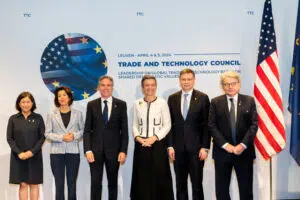Brussels – Now, the long shadow of Donald Trump is also looming over one of the most positive chapters of cooperation in the past three years between the European Union and the United States. The EU-United States Trade and Technology Council (TTC) met yesterday and today (April 4-5) in Leuven to take stock of progress in a dialogue that has continued uninterrupted since September 2021, for the last time before the big election year for both the European Union and its overseas partner. “as both sides enter their respective electoral processes, the EU and US will reflect on the lessons learned so far and possible ways forward,” the European Commission explained in a statement without giving anything away of the future of the TTC. Especially with the risk of The Donald returning to the White House, which already concerns Brussels.

Taking part in the latest high-level meeting between this European Commission and the Biden administration were all the co-chairs of the TTC. For the EU, the executive vice presidents Margrethe Vestager (for Digital) and Valdis Dombrovskis (for Economy) and the Commissioner for the Internal Market, Thierry Breton, while for the United States, the Secretary of State, Antony Blinken, Secretary of Commerce, Gina Raimondo, and Trade Representative, Katherine Tai. “The meeting took place in a difficult geopolitical context,” amid the Russian war in Ukraine and “global economic pressures,” which is why it was even more essential for the two partners to line up the priorities of the dialogue that began on September 29, 2021, in Pittsburgh, Pennsylvania, and to indicate the trajectory of technical work to continue on the main dossiers of cooperation: artificial intelligence, 6G, semiconductors, raw materials, and the respect for fundamental rights online.
Themes of the Sixth EU-United States TTC
First and foremost, the parties share the commitment to a risk-based approach for artificial intelligence and the support of secure and reliable technologies, on which “a new dialogue between the EU IA Office and the U.S. Security Institute on the development of tools, methodologies, and benchmarks for measuring and evaluating artificial intelligence models” will be set. They also adopted a joint statement on the “Common Vision to 6G defining a path for leadership on this technology,” accompanied by an administrative agreement for research collaboration. Also, on the digital front and emerging technology standards, the two partners are finalizing a report on digital identity mapping with the goal of “identifying use cases for transatlantic interoperability” and cross-border use of each other’s digital identities (which will be available from 2026 for EU citizens).
In the field of semiconductors, the European Union and the United States will extend for another three years the two administrative agreements that laid the foundation for collaboration to “detect supply chain disruptions in a timely manner and ensure transparency of subsidies” and joint work will also be intensified in research “to find alternatives to per- and polyfluoroalkyl substances (Pfas) in chips, including by leveraging AI capacities.” Within this framework, Brussels and Washington see sustainable trade as a “priority and part of the green transition.” With this in mind, a joint catalog of best practices on green public procurement will be published “to help accelerate the uptake of publicly funded sustainability projects.” Not forgetting to ensure “a fair transition for workers and firms up and down the supply chain,” the joint statement stresses.
On sustainable trade, the parties reiterated the centrality of clean energy incentives “as a trading platform to avoid zero-sum competition and trade and investment distortions in the clean energy sector,” including recommendations for greater transatlantic compatibility of electric vehicle charging infrastructure. Indispensable to efforts to accelerate the green transition are critical raw materials, on which the EU and the U.S. are “advancing negotiations” on an agreement that “aims to strengthen supply chains for electric vehicle batteries,” with focus on “strengthening labor and environmental protection” in the international critical minerals supply chains. It is also why they launched the Minerals Security Partnership Forum (jointly chaired by the two partners) today to continue pushing “future cooperation” between Brussels and Washington in this area.
Finally, the issue of the protection of fundamental rights in the online and digital sphere. The European Union and the United States agree that online platforms “should exercise greater responsibility in ensuring a fair, transparent, and accountable digital environment,” including combating gender-based violence, empowerment of children, and access to data for researchers, “in line with the Digital Services Act” (the EU Digital Services Act). Also, in the run-up to the European, U.S., and other rounds of elections -“in a year when many elections take place around the world” – the partners on both sides of the Atlantic say they are “determined” to support democracies around the world and to defend human rights and free and independent media and “combat foreign information manipulation and interference,” including through “joint recommended actions” for online platforms on the protection of online human rights defenders.
English version by the Translation Service of Withub
![La direttrice di Carnegie Europe, Rosa Balfour, con la rappresentante per il Commercio degli Stati Uniti, Katherine Tai [Bruxelles, 4 aprile 2024. Foto: Carnegie Europe, account X]](https://www.eunews.it/wp-content/uploads/2024/04/tai-carnegie-350x250.png.webp)




![Mercato immobiliare [foto: imagoeconomica]](https://www.eunews.it/wp-content/uploads/2023/11/Imagoeconomica_1925354-e1699368704221.jpg.webp)

